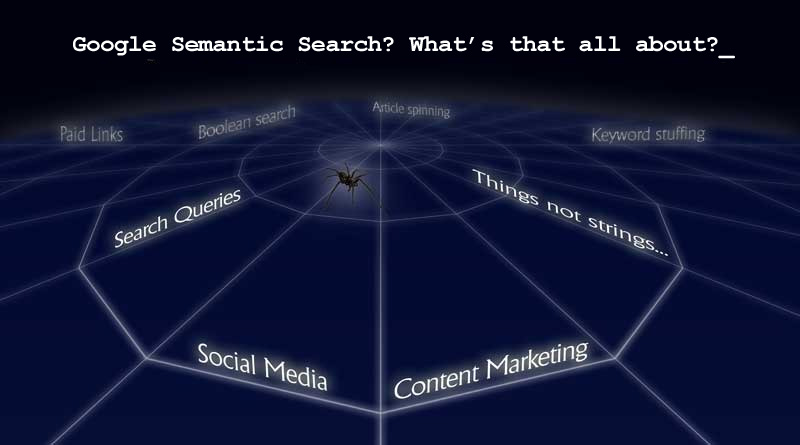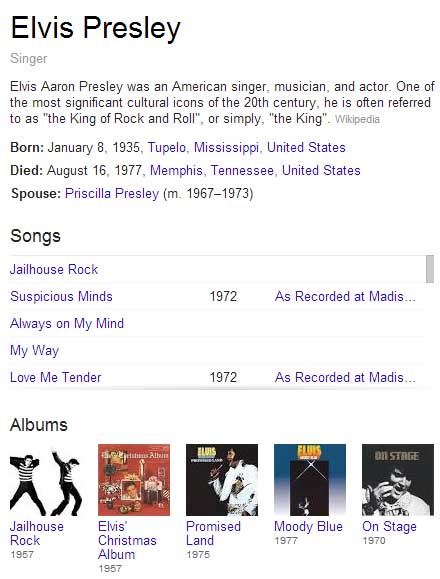Google Semantic Search – What’s that ?
 Google search is changing. Coming up is a series of articles on why being ready for semantic search is important and what, if you have a business with an online presence or you are an Internet marketer, you need to know:
Google search is changing. Coming up is a series of articles on why being ready for semantic search is important and what, if you have a business with an online presence or you are an Internet marketer, you need to know:
- How Google search is getting smarter
- What is the impact of Google’s Knowledge Graph?
- Why great website content is critical for semantic search
- How to optimise web pages for semantic search
- Why social media for business is broken and how you can fix it
But first, here are some questions for you to answer…
Q1. How old was the King of Rock and Roll when he died?
Q2. What’s the cubed root of 74,088?
Q3. What is the answer to life, the universe and everything?
How did you do?
Here are some links to the answers.
A1. If you are not old enough to remember or you are not a fan of the man called “The King of Rock and Roll”, then the answer is here…
A2. If you are not great with numbers, then here’s the answer to the cubed root of 74,088…
A3. And if you didn’t grow up with, or haven’t been introduced to the quirky brilliance of the late author Douglas Adams, then you probably won’t know the last answer which is here…
If you answered 3/3 correctly, well done but unfortunately there’s no prize! Quite possibly, unless you are super clever with numbers, you wouldn’t have known the answer to Q2, but you may have been smart enough to work it out from knowing the other two.
Google search is getting smarter
The fact that the answer to all three questions above was 42 is not really significant, but if you clicked each of the links to the answers above you will have seen that for each question, Google was able to give you the answer – straight ‘out of the box’ – you didn’t even have to click through to another page.
Google says that there are over 60 trillion web pages on the Internet. That’s an astonishing number, especially when we appreciate that is the number of pageson the Internet; not the many more words, images or videos contained within them. Yet despite the astonishing amount of information available to us, the fact is that information (or just data which is what it boils down to) is only useful if you can make sense of it.
Solving the Information Explosion
As the World Wide Web has grown exponentially, search engines, like Google, have tried to keep up by serving us with useful answers to the questions and information we have been searching for. The problem is, the more the Web has grown, the more data has exploded, so the harder it becomes to mine the best answers from the ever deepening strata of information.
It’s not really the amount of information or the indexing of it that creates the problem. In the most part, Google’s index of keywords has enabled them to find information (e.g. in pages) and provide useful results to match the keywords we have entered. But until recently, there was not a way to connect that information and understand the meaning of it.
It may seem a strange thing to say, but Google search was dumb! Our reliance on Google to find the information we were looking for, was predicated on Google needing us to use the right words to get to that information. But now, the world’s leading search engine has been given a brain.
The idea and vision of the Web where computers were able to not just match keywords but understand the meaning of those words and how they interconnected was something Tim Berners-Lee wrote about back in 2001. Now, just 13 relatively short (but perhaps long on technology) years later, we are beginning to see that vision become a reality.
It is the interconnecting of information which is making Google search smarter. By their growing ability to understand the meaning of words and the interconnection of those words to other words to provide context and additional meaning, Google is turning information into knowledge. We are at the dawning of a new age of search. What is more Google is also able to understand YOUR search query which in some cases may be the same as mine (e.g. Roses to you could mean flowers, where as roses to me could mean a band – The Stone Roses) and produce different search results for both of us based on the information they know about our search history and interests.
So, what are we seeing now and what can we expect for the future on the Web?
The Impact of Google’s Knowledge Graph
 Source: Elvis Presley search from google.co.ukGoogle’s answer to mining the Internet’s information has been the development of its Knowledge Graph. Released in May 2012 (watch Google’s video), the Knowledge Graph is, as Google said at the time, “a critical first step towards building the next generation of search, which taps into the collective intelligence of the web and understands the world a bit more like people do” .
Source: Elvis Presley search from google.co.ukGoogle’s answer to mining the Internet’s information has been the development of its Knowledge Graph. Released in May 2012 (watch Google’s video), the Knowledge Graph is, as Google said at the time, “a critical first step towards building the next generation of search, which taps into the collective intelligence of the web and understands the world a bit more like people do” .
An example of Google’s Knowledge Graph at work can be seen in the question about Elvis. When asking, “How old was the King of Rock and Roll when he died?”, Google not only gives us the answer, but also provides further information that may be useful to us as it is relates to the answer.
Google’s “smartness” in processing this search result shows that it understands the meaning of the words we used and the intent of the question we asked. It then uses its understanding of our question to draw out the answer from its knowledge index – the Knowledge Graph.
Notice, we didn’t have to use the name “Elvis Presley”. Google knows, from the information it has gathered and understood, that Elvis is popularly known as the King of Rock and Roll. Google has connected those two things (or entities as they are called in semantic search, i.e. what is known about an item of data) and linked them together in its Knowledge Graph. Google has also interconnected other knowledge about him, not just the date he was born and died (and therefore is able to calculate his age when he died), but also who he was married to, the songs he sung and the movies he appeared in.
A brief, but important explanation about Entities
All of these independent pieces of information: Elvis, the songs he sung and the movies he appeared in, are entities which Google knows about, and for each it will know facts associated with them. For example, a movie has actors, a director, it can be shown in a cinema or you can buy it on a DVD. The facts about an entity can be many and varied, but by gathering the facts about an entity you can begin to make connections with other entities, for example, the composer of the movie score. Through the pathways created by the connections between related information, you can then uncover more and more information. By joining the dots, so to speak, you start to turn the collections of those facts into knowledge.
In the previous keyword-indexed web, information based on keywords alone was isolated and locked in siloes and it was up to us to extract knowledge from those siloes by the keywords we used to unlock them. In the semantically-indexed web which Google is able to uncover for us through semantic search, the siloes containing information are not just unlocked, they are removed completely, meaning that knowledge through search becomes much more accessible to us.
For a more detailed explanation about Entities, you may find David Amerland’s presentation at the SMX conference in 2013 useful.
From Strings to Things
Going back to the Knowledge Graph answer to the question we asked originally, we see that Google provides us with additional snippets of information that are all hyperlinked, so that if you wanted to drill down more, the information is right there in front of you. As we can see, this Knowledge Graph answer is just a summary of the knowledge Google is able to connect and discover for questions about Elvis Presley. Through the Knowledge Graph, Google is able to not only answer the questions we ask, but also provide us with answers to other related questions we may go on to ask or may not yet have even considered asking.
Through the Knowledge Graph, Google search is changing to what they describe as from strings to things, from a raw index of words to a rich index of knowledge. To start with, the Knowledge Graph (its semantic index) was limited to those things that Google knew most about such as “landmarks, celebrities, cities, sports teams, buildings, geographical features, movies, celestial objects, works of art”. But Google’s vision to develop semantic search means that it is steadily expanding its semantic index.
Google Search is changing. Queue your opportunity… the value of great content.
This is the first in a series of three articles on semantic search:
- Google Semantic Search? What’s that all about?
- Why great website content is critical for semantic search
- Why social media for business is broken and how you can fix it
Footnote: Thanks to David Amerland for his book, “Google Semantic Search” and his generous help on the subject of semantic search on Google+. I encourage you to buy the book!
